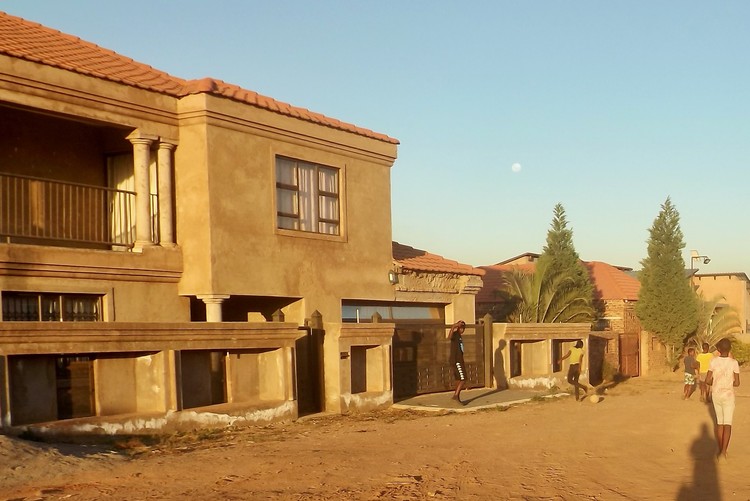Tshwane’s illegal suburb leaves residents stuck without services
Plots in Leeuwfontein were sold for R80,000
Leeuwfontein may look like a new suburb being developed, but it is in fact an unrecognised informal settlement. Photos: Warren Mabona
- Hundreds of plots in Leeuwfontein near Mamelodi were sold to people illegally.
- The buyers have built spacious houses and some have been living there for more than five years but without basic services.
- The City of Tshwane says the development was done without permission, planning or lawful subdivision.
At first glance, Leeuwfontein, near Mamelodi, east of Pretoria, looks like it might be an attractive place with large houses and high boundary walls and some double-storey homes that you might expect to see in an affluent suburb.
It may not look like it, but Leeuwfontein is in fact a spacious informal settlement of brick and mortar. It has no basic services – no electricity, tap water or sewer system. The streets are muddy and becoming potholed. Tall grass grows on the verges. The owners of the houses have no title deeds and as far as the City of Tshwane is concerned this is all private property.
Residents we spoke to say Leeuwfontein started over ten years ago. People bought plots from a businessman, whom they can only identify as Mr Marema.
Nenkie Mashowa said she paid R80,000 for her plot. “I did not get a title deed from Mr Marema, because I’m still paying for it through instalments,” she said.
Mashowa said many of Leeuwfontein’s residents are professionals who work in government and the private sector.
Jubilee Mtweni, a nurse, said she also paid R80,000 for the plot on which she built her house.
Mtweni and Mashowa told GroundUp they bought their plots from Marema in the past four years. Marema promised them that there would be development in the area, including the delivery of basic services.
“Our hopes for a good life were dashed by a lack of electricity and running water,” said Mtweni.
“We got together as residents and asked for services from the City of Tshwane several times in the past, but they always told us they could not give us services because we live on private land.
“We have the right to basic services like other people, even though we stay on private land,” she said.
Mashowa said she and other residents had hired plumbers to install makeshift sewer drains.
“We have to hire a truck to remove sewage waste from our yards every month and this service is expensive. The City of Tshwane only delivers drinking water into tanks on the streets twice a week. I’m not sure how many tanks there are but this water is not enough.”
Precious Ramoba said some residents have connected electricity illegally, but it often trips.
“I have been staying here since 2019 and life is not good as we have no formal electricity supply,” she said.
“Our houses and streets are dark at night. It’s difficult to walk and drive on the streets because they are full of rocks and mud on rainy days. I’m also scared of criminals because there is tall grass on the side of some streets, where they can hide and attack us.”
Another resident, who has a government job and asked not to be identified, said he paid Marema R80,000 in 2016 and built a double-storey house for his family.
“I finished paying for my stand a long time ago, but we still have no running water and electricity. I have a generator in my home. But we only use the generator when I’m home because my wife and my children cannot start it. We always have to make sure that our children are in our yards at night because our streets have no lights and are not safe.”
“The City must formalise this area and give us services,” he said.
GroundUp estimates there are about 300 households and there are more houses going up.
City of Tshwane spokesperson Lindela Mashigo said Leeuwfontein is an informal area.
“The owners subdivided and sold the land to residents illegally,” said Mashigo.
He said it is not the responsibility of the City to formalise the area. He said the owner of the land must apply for the establishment of a township in order to apply for service infrastructure.
“The owner of the land must also apply for land use management from the City … before proceeding with any development on the land.”
The City currently provides rudimentary water services and chemical toilets.
Mashigo said the City had also installed four high mast lights but these were used for illegal electricity connections causing blackouts. The City then disconnected the lights for safety reasons.
GroundUp spoke to Mr Marema on the phone and then met him at his residence where there is a sign for “Mirror Properties”.
We asked him about the provision of services.
“I’m not saying anything to you now,” he said.
He refused to give his first name.
Some residents of Leeuwfontein have connected electricity illegally using their own poles, wires and transformers, but power often trips.
© 2023 GroundUp. This article is licensed under a Creative Commons Attribution-NoDerivatives 4.0 International License.
You may republish this article, so long as you credit the authors and GroundUp, and do not change the text. Please include a link back to the original article.
We put an invisible pixel in the article so that we can count traffic to republishers. All analytics tools are solely on our servers. We do not give our logs to any third party. Logs are deleted after two weeks. We do not use any IP address identifying information except to count regional traffic. We are solely interested in counting hits, not tracking users. If you republish, please do not delete the invisible pixel.




